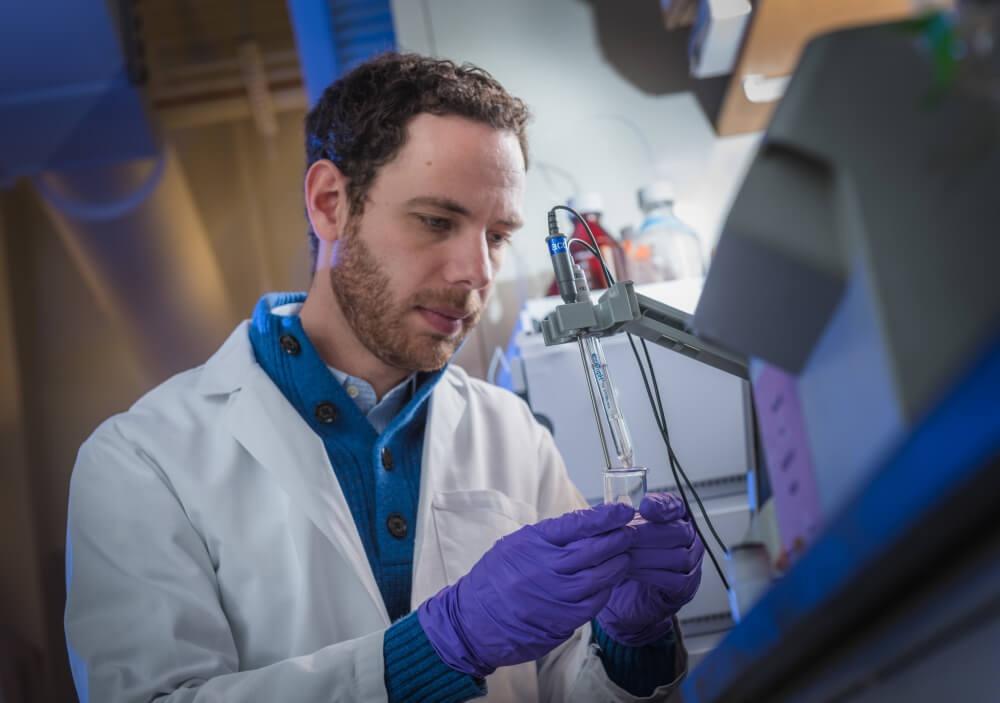Surge Therapeutics’ CEO & Founder Michael Goldberg
Surge Therapuetics
Surge Therapeutics is working on a treatment that, when applied during an operation, might help surgically-removed cancers from coming back.
When someone has a tumor localized to one part of the body, the traditional treatment is pretty simple: use surgery to cut it out. But such surgeries aren’t perfect. Tumors can grow back, often bolstered by a suppression of the immune system that can follow surgery.
Cambridge-based Surge Therapeutics aims to change this with the hydrogel immunotherapy treatment it is developing. The company’s product aims to be to tumor removal what Neosporin is to a cut or bruise: it’s applied after the removal of the tumor with an aim to decrease the likelihood that the cancer comes back.
On Wednesday, the company announced it has raised a $32 million series B round. The deal brings its total venture investments to $60 million. The company plans to use the new investment to continue development of its immunotherapy and to advance clinical trials for it.
Broadly speaking, immunotherapy is a range of cancer treatments that aim to strengthen the immune system’s ability to fight cancer. But what makes Surge’s solution different is that it’s applied during surgery as opposed to other immunotherapies that are delivered weeks before or weeks after surgery.
Michael Goldberg, the CEO and founder of the company, explains that the fact that these cancer treatments can’t be administered in the weeks surrounding the surgery is why his company’s product is so needed. “So there’s a month in total: two weeks before two weeks after, sometimes longer, but a month where the patient isn’t getting medicine,” he explains. “and it turns out that it’s actually likely the most critical time, the most high leverage time and place for them to be receiving medicine.”
Goldberg has long been interested in biology. Born in Toronto in 1981, he got his Bachelors in biological chemistry at the University of Toronto, then attended the University of Cambridge in England for a Biotech MBA. From there he went to MIT, where he completed his PhD at MIT under the mentorship of Moderna founder Robert Langer.
After receiving his doctorate, he studied under the mentorship of Biogen founder Phillip Sharp. He was then hired to be a professor at Harvard Medical School. In his laboratory there, his lab discovered that in multiple types of cancer they could both prevent cancers from coming back and make the body more resistant to cancer developing elsewhere by releasing immunotherapy at the site and time of surgical tumor removal.
“It’s an off the shelf solution to reprogram the immune system.”
It was this research that led him to found Surge in 2018. The company’s mission, he says, “is to create a world where nobody loses a loved one to preventable recurrence following cancer surgery.”
After optimizing its product formulation and completing preclinical studies, the company secured its first IND from the FDA in 2023, and initiated its first clinical trial in the same year
In this trial, Surge was able to dose two patients in a phase with their candidate, STM-416, for patients with recurrent bladder cancer. The dose released a hydrogel containing an antitumor drug at the site of the tumor removal. This was done to improve survival outcomes for patients who get surgery for this disease. Goldberg claims that this is the first time that any human patient has received intraoperative (which means “during the operation”) immunotherapy.
The series B round, which was led by Bioluminescence Ventures and includes participation from Piedmont Capital, KdT Ventures and other firms, is geared toward gathering clinical data, taking three programs through phase one and the lead of its three programs through phase 2A which will generate proof of concept data that the cancer will not return after their product is used.
Phil Grayeski, a partner at KdT Ventures, says one of his firm’s reasons for investing is that it believes that “intraoperative immunotherapy is gonna become the standard of care.” He adds that what makes Surge unique is that it’s a simple solution that delivers immunotherapy directly to the tumor as opposed to other immunotherapies that are more toxic. “It’s an off the shelf solution to reprogram the immune system.”
Goldberg says the objective is to change the standard of care. He also discussed the magnitude of this impact to produce a one and done treatment to prevent cancer recurrence for the benefit of the individual patient and the healthcare system at large.
“We’re extremely excited that this has the potential to revolutionize how cancer patients are treated,” he says.


